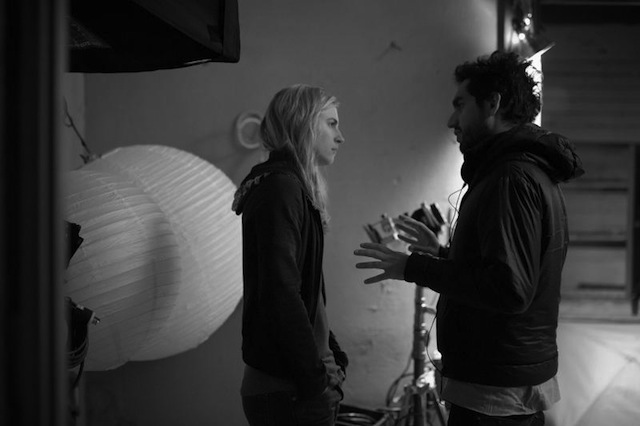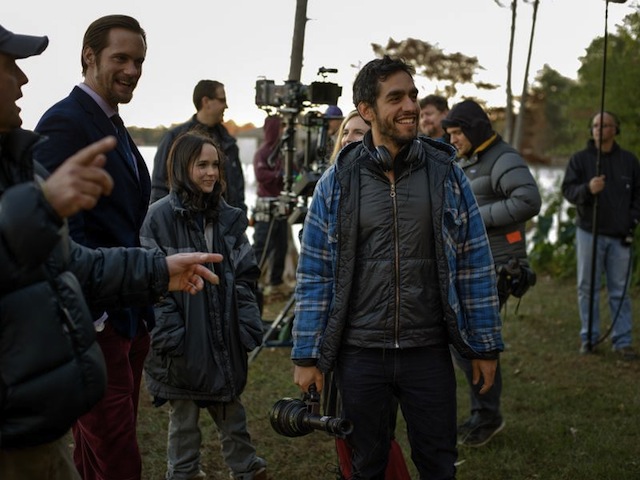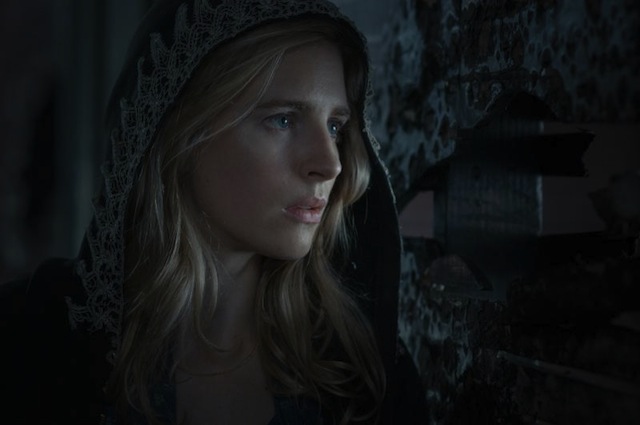CHICAGO – Patrick McDonald of HollywoodChicago.com appears on “The Morning Mess” with Dan Baker on WBGR-FM (Monroe, Wisconsin) on March 21st, 2024, reviewing the new streaming series “Manhunt” – based on the bestseller by James L. Swanson – currently streaming on Apple TV+.
Interview: Brit Marling, Zal Batmanglij Journey to ‘The East’
CHICAGO – If you don’t like the roles you’re being offered, why not write them yourself? That has been the philosophy of actress Brit Marling, who taught herself the art of screenwriting in order to create the sort of complex female roles Hollywood avoids like the plague. She’s played a tragically damaged woman in Mike Cahill’s sci-fi drama, “Another Earth,” and a beguiling cult leader in Zal Batmanglij’s psychological thriller, “Sound of My Voice.”
In her new film, a topical mind-bender entitled, “The East,” Marling re-teams with director Batmanglij for her most audacious effort to date. She plays Sarah, an operative assigned by an intelligence firm to infiltrate an anarchist group (dubbed “The East”) notorious for its anti-corporate activism. But as she befriends the tight-knit group headed by the dashing Benji (Alexander Skarsgård), Sarah finds her views starting to radically shift. Hollywood Chicago spoke with Marling and Batmanglij about their views on modern America, the importance of creating strong female roles and tackling issues fraught with ambiguity.
HollywoodChicago.com: What made you want to explore the moral ambiguity of modern America, characterized by frakking and corporate-sponsored wars?
Zal Batmanglij: We live in a morally gray world. Generations ago, it may have been easier to see things more clearly, in terms of what’s right and what’s wrong. I think that’s very hard today. I am constantly reading about things that raise questions I can’t answer.
Brit Marling: Sarah feels that she knows what justice is and the difference between right and wrong. As she has this experience undercover and infiltrates this world, she finds that the world is very complex. It’s difficult to determine what you can stand firmly behind.

Brit Marling and Zal Batmanglij on the set of The East.
Photo credit: Fox Searchlight Pictures
HollywoodChicago.com: “The East” is a very complimentary piece with “Sound of My Voice,” since both are about an outsider’s journey into an enclosed community.
Batmanglij: “Sound of My Voice” and “The East” were written around the same time, so there’s spillage over both. We were both really interested in identity and fascinated by the idea of deep cover as a sort of metaphor for how we all feel in our ’20s as we try to figure out who we are. We put on these hats of filmmakers, and you put on the hat of a journalist, and we go through these rituals together.
HollywoodChicago.com: Was this always meant to be a bigger undertaking than your previous film?
Batmanglij: Yeah, it was always meant to have more moving parts, but wasn’t meant to have a bigger budget. We thought we could have all those parts at a super low-budget, using the hyper-reality of real life.
Marling: We didn’t have that much time, and it’s such an ambitious film with lots of locations, a big cast and some huge stunt pieces. It was shot in about 25 days. It didn’t feel that different from “Sound of My Voice” in the sense that we were still moving fast all the time. Every day onset when I’d look at the call sheet, I’d think, “There’s no way we’re going to make this day,” and then Zal would miraculously pull it off. I don’t think we ever strayed too far from how we started making films, which is built around this sense of, “We’re just going to roll up our sleeves and do it.” Everybody is going to wear a lot of hats and has to come to the project because they love it.
That is the energy that creates a kind of tribal feeling, whether you are making it for $100,000 or a few million dollars. If people are coming to the set not because they’re getting a paycheck or because they think it’s the right career move, but because they feel the story has a meaning, and for that time period, it gives their life a sense of purpose, that energy onset is contagious. We felt that every day making this movie, and we feel it even now talking about it with people. It doesn’t feel like you’re selling something. It feels like you’re having a conversation that you want to have with people about a subject that you’re interested in.
HollywoodChicago.com: Sarah is able to transcend political boundaries and connect with people on a human level, which is remarkable at a time when so many people view the world in black and white.
Batmanglij: We have more access to diverse opinions than ever before, and yet our opinions are more reified than ever before. Bill Clinton recently said that the latest American affliction is our inability to be around people who think differently than we do. And it’s so true. We can’t be around people who think differently from us. It was a shock to me when I saw the racial hate on Twitter when Obama got elected the second time. I couldn’t believe kids and teenagers would talk like that on their Twitter in a public way. I realized that I must live in a super-sheltered space.
Marling: Our world has become so complex that nobody wants to really look at it. It’s sort of like a thoroughbred racehorse with the blinders on. You just keep running around the track in order to win. It’s a weird moment when you allow yourself to take the blinders off and engage in a conversation where you really listen to other people.

Alexander Skarsgård, Ellen Page and Zal Batmanglij on the set of The East.
Photo credit: Fox Searchlight Pictures
HollywoodChicago.com: Many people have been unfriended on Facebook because they voted for a particular politician.
Batmanglij: But I also kind of agree with that. People who were supporting [Mitt Romney]…were they on crack? [laughs]
Marlingj: What’s interesting about this movie is that it doesn’t seem to matter if people are on the far right or the far left or anywhere in between. Everyone seems to agree right now that something is amiss with corporate greed. Everyone feels that the BP oil spill was handled badly. Nobody thinks it’s right to use dispersant in order to get rid of the oil for photographs. The dispersant is a worse chemical in many ways than the petroleum. It’s all gotten weird and muddled, and that’s why it’s interesting to talk with people about this movie who are on both sides of the political spectrum. It seems that the one thing everyone can agree on, if there’s anything to agree on, is that it’s a frustrating time. Certain things have gotten so powerful that they’re almost unassailable. How do you make people accountable?
Batmanglij: The story about kids dying from cancer after bathing in arsenic-tainted water is true. You read about it, your heart breaks and you think, “How can this be in America?” [Spoiler Alert] In our story, we wanted The East to force the CFO of that company to go in the chemical water, but are caught off guard when he insists on going in himself. People in these corporate positions are obsessed with those little touches of power, so he wants to take over the situation somehow. Like a lot of people who are very wealthy and successful, he’s very insulated from reality, so when he gets in the water, he has an emotional baptism.
HollywoodChicago.com: Why was the decision made to have Sarah listen to Christian radio?
Batmanglij: I think that she’s a person of faith in a very traditional sense of the word, and she maintains it the whole movie. The last bit of dialogue in the movie is Sarah saying, “Amen,” but I think that she comes to regard her faith in an entirely different light by the end of the movie. I think that she believes in a new way.
HollywoodChicago.com: One aspect of The East that goes against the grain of modern society is the depth of their connection to one another.
Marling: One of the most shocking things I’ve found about the movie is that people are really unsettled about the group bathing scene. People are dismembered in video games and nobody flinches. Then you have a scene where people are just in the water, touching each other, and people can’t handle it. We’ve become so afraid of intimacy and so afraid of personal contact, always retreating to the Twitter/Facebook portal.
Two years ago, we had an amazing experience where we traveled and lived with groups that were in this vein. They were so connected to each other. At first, it was weird to sleep with ten people in a room the size of a [hotel living room]. You’d wake up one morning and see someone else in your sneakers. Then at some point, you just became so glad to have a community and a tribe. You stopped thinking about yourself. It was an amazing thing to let go of your identity. There are no mirrors, and you start to forget what you look like. The “you” sort of dissolves into a group, which can sound a bit like Stockholm Syndrome in a story like this one.

Brit Marling stars in Zal Batmanglij’s The East.
Photo credit: Fox Searchlight Pictures
HollywoodChicago.com: As a woman in Hollywood, is it important for you to create a space for yourself?
Marling: For sure. When I grew up watching movies and watched men and women share the screen, I assumed that it was all balanced. It’s not until you start acting in them that you realize women are always going to be in a submissive position. You’re always going to be passive. Your job is to serve up the scene so the male protagonist can say his piece. It took me a while to realize that from an acting perspective, and then of course, I started writing. I got very lucky in that both Mike and Zal are really interested in strong women. When we sit down to write something, we talk about the idea of trying to write a girl who acts with agency and is somehow driving the action of the film, rather than simply have it happen to her. It’s a hard thing to do because you find yourself putting her in passive positions because that’s what you’ve been raised watching.
Batmanglij: Imagine if Sarah was a guy. Then he’d be handsome, and you’d have totally different sexual elements to contend with. You don’t want to get into a space where you’re like, “I’ll imagine him as a guy but then just change his gender.”
Marling: Then she’s just strong in the way that men are strong. We want to explore what a woman is like who’s strong in the way that women are strong. We don’t actually know what that looks like because women haven’t gotten to write about them.
Batmanglij: Or if they have, as in “Thelma and Louise,” someone like Ridley Scott directs it. In the case of that film, it created a great balance and it was something that people could digest at the time. But imagine if Bigelow had directed it, or someone even more feminine…
Marling: And we seem to have gone backwards from that moment. I was reading something recently where an interviewer was asking a young girl if she was a feminist, and the girl was like, “Oh no, I’m not a feminist,” as if that word has somehow gotten dirty.
Batmanglij: People who are not feminists or environmentalists are on crack because it’s absolutely [mandatory] to care about both causes.
HollywoodChicago.com: The piano piece that materializes throughout the film is quite memorable, with its single note that resonates like an exclamation point.
Batmanglij: My brother wrote that piece. It’s so soulful. I remember Toby [Kebbell] used to practice it in the house every day, and Skarsgård would lie down on the grass and just listen to the music through the open window. [Spoiler Alert] The movie used to end not with the coda, but with the shot of Sarah. When you heard the “ding” of the score, you knew that The East had entered her at some level. We’ll have that on the Blu-ray extras.
HollywoodChicago.com: Which is more forgivable: to do the right thing for the wrong reasons or the wrong thing for the right reasons?
Marling: It’s so hard to say. I tend to think that the means cannot justify an end, but that’s because of how I’ve started to live my life. I used to think that what you did for a living was separate from who you are, but it’s not. The thing that you do daily is who you are, so I am very preoccupied with the idea that if you do a certain series of actions in order to get some end, you are going to become that person along the way. Even if you think the end is noble, you can’t avoid the way you got there.
 | By MATT FAGERHOLM |


